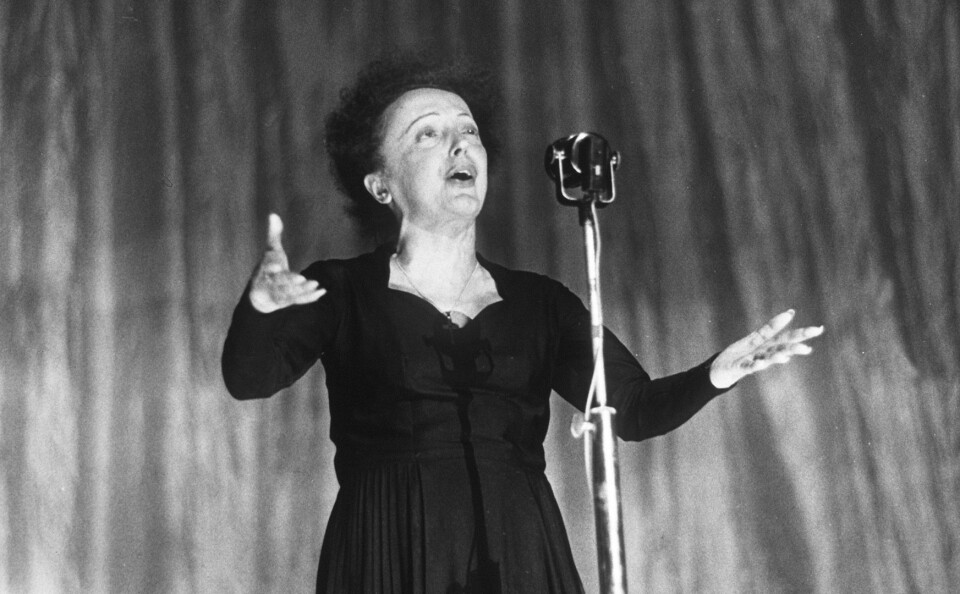-
Films and shows to watch in February to improve your French
From understanding l’accent du midi to scenarios that have divided critics
-
Films and series to watch in January 2026 to improve your French
France is a hub of talent when it comes to film and TV, and watching in French can greatly improve your language skills
-
5 French films and TV series to watch in December
From comforting comedies to powerful documentaries, there is something for everyone this winter
Edith Piaf to narrate her own life story in French film thanks to AI
Artificial Intelligence is being used to generate the singer’s speaking voice for a new biopic

The latest AI technology is being used in a new film to provide the voice of singer Edith Piaf.
Artificial intelligence is not being used to recreate Piaf’s singing – there are many recordings of that – but, rather, her speaking voice.
This is used to narrate the story of her life as the film moves through the 1920s to 1940s and between Paris and New York.
It will be combined with a mix of archive video footage and new animation.
The film-makers say they hope to inspire new generations with Piaf’s “incredible resilience” and to give fresh insight into her life.
Read more: From poverty to glory: Life of legendary French singer Edith Piaf
Story of incredible resilience
French writer and director Julie Veille, who came up with the idea, said: “When creating the film, we kept asking ourselves ‘if Edith were still with us, what messages would she want to convey to the younger generations?’.
“Her story is one of incredible resilience, of overcoming struggles, and defying social norms.
“We wanted to bring this timeless story to audiences of all ages.”
Ms Veille’s company Seriously Happy is working on the production with Warner Music and says the film will showcase Piaf’s “indomitable spirit” and “uncover aspects of her life previously unknown”.
The firms declined interviews or to provide initial images as the film is still being made and no release date has yet been set.
It is expected to make the next big splash about Piaf after the 2007 French biopic La Môme, starring Marion Cotillard.
‘She loved to play practical jokes’
Curator of the Edith Piaf museum Bernard Marchois, a friend of the singer, told The Connexion he is reserving judgement about the use of AI until he has seen the film.
He said: “I hope the film will get younger people talking about her more because it is in a modern format, but, at the same time, she does not really need it as everyone already knows Edith Piaf.”
Mr Marchois said he knew Piaf in her later years after being introduced by friends.
His museum, which opened in 1968, shows off some of her stage dresses and day clothes, as well as artworks, posters and letters.
It is in a Paris apartment where she once lived, a stone’s throw from her grave at the Père Lachaise cemetery.
He said: “She was very funny, she loved to laugh and have fun and play practical jokes, but she was very disciplined too.
“When she was rehearsing songs, it was work, work, work.
“My strongest memories are of her songs as she rehearsed, or in concert.
“Each time I was blown away to see this tiny woman with such a powerful voice and incredible presence.”
Read more: Why Paris metro busking can be a career springboard for musicians
‘She started as a street singer, like her mother’
Born to a poor family of entertainers, Piaf (1915-1963) had a mixture of French and immigrant ancestors, including from Italy and Kabylia, a mountainous coastal area in Algeria.
Her mother was unable to look after her and passed her on to live with her grandmother, who is said to have neglected her.
Her surname was Gassion but her first promoter, nightclub owner Louis Leplée, billed her as la môme Piaf due to her slight build and 1.47m height: môme means ‘kid’ and piaf is Parisian slang for ‘sparrow’.
Mr Marchois said: “She started as a street singer, like her mother. Her father was an acrobat and her uncles were circus horsemasters.
“Her mother was Italian and Edith had descendants on her mother’s side who were Kabyle, which helps us understand her voice, which was a very particular one, a Kabyle singer’s voice – she inherited that.
“Kabyle singers sing with a power that comes from the stomach and chest, not just from the throat.
“Edith hadn’t taken singing lessons, it was natural for her.
“She learned to sing in the street and could sing without a microphone.”
As for her pronunciation, with its strongly-sounded Rs, Mr Marchois said it was not something she aimed for, but her natural way of speaking, typical of Parisians of the day.
She became a star overnight
Her big break came when she was singing in the street, near the Champs-Elysées, he said.
“A lot of people gathered, surprised at the beauty of her voice. The director of a cabaret on the Champs-Elysées was passing and asked her to come and audition, and she became a star from one day to the next.
“The next year she was already a superstar and making plans to go to America. She was a huge success and went there nearly every year until she died.”
In the early days, she sang other people’s songs, such as Les Mômes de la cloche (1917, by French songwriters, about street beggars and tramps) but went on to write more than 80, and record more than 300 in total, including La Vie en Rose.
However, the latter was registered under the name of her accompanist Louiguy, as Piaf was not yet signed up with the copyright body Sacem.
Read more: These 10 songs can help you improve your French
‘She didn’t hide anything about her private life’
Mr Marchois, who also founded two Piaf fan clubs, said her great success, despite a modest background and immigrant ancestors, is inspirational.
“Now, she is seen as ‘the’ French singer,” he said.
“What people love is her sincerity: she does not fake anything. She sang her life and people were sensitive to that.
“And she never had a big head. She knew she was a star but didn’t make a fuss about it.
“And she didn’t hide anything about her private life – if she had a new love, she said so, and people loved this openness.”
Along with La Vie en Rose, probably her best-loved hit was Je ne regrette rien.
“In that, she is taking stock of her life and career, and says that she regrets nothing. It’s like a last will and testament in a song,” Mr Marchois said.
Related articles
What the new digital law will change for people in France
Village tries out AI cameras - and stops 8 fires in south of France
























